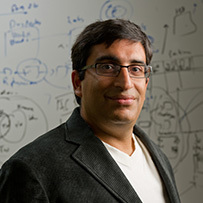
University of Notre Dame researchers have developed a computer-aided method that uses electronic medical records to offer the promise of rapid advances toward personalized health care, disease management and wellness.
Notre Dame computer science associate professor Nitesh V. Chawla and his doctoral student, Darcy A. Davis, developed the system called Collaborative Assessment and Recommendation Engine (CARE) for personalized disease risk predictions and well-being.
“The potential for ‘personalizing’ health care from a disease prevention, disease management and therapeutics perspective is increasing,” Chawla said. “Health care informatics and advanced analytics, or data science, may contribute to this shift from population-based evidence for health care decision-making to the fusion of population- and individual-based evidence in health care. The key question is how to leverage health population data to drive patient-centered health care.”
At the heart of CARE is a novel collaborative filtering method that captures patient similarities and produces personalized disease risk profiles for individuals. Using what is known as Big Data science, the system generates predictions focused on other diseases that are based on Big Data from similar patients.
“In its most conservative use, the CARE rankings can provide reminders for conditions that busy doctors may have overlooked,” Chawla said. “Utilized to its full potential, CARE can be used to explore broader disease histories, suggest previously unconsidered concerns and facilitate discussion about early testing and prevention, as well as wellness strategies that may ring a more familiar bell with an individual and are essentially doable.
“We believe that our work can lead to reduced re-admission rates, improved quality of care ratings and can demonstrate meaningful use, impact personal and population health, and push forward the discussion and impact on the patient-centered paradigm.”
Chawla points out that the core premise of CARE is centered on patient empowerment and patient engagement.
 Nitesh V. Chawla
Nitesh V. Chawla
“Imagine visiting your physician’s office with a list of concerns and questions,” he said. “What if you could walk out of the office with a personalized assessment of your health, along with a list of personalized and important lifestyle change recommendations based on your predicted health risks? What if your physician was afforded a limitless experience to gauge the impact of your disease toward developing other diseases in the future? What if you could find out that there are other patients similar to you not only with respect to major symptoms, but also with respect to rare issues that have puzzled your doctor? What if you could have the experience of others at your fingertips and fathom the lifestyle changes warranted for mitigating diseases?”
Chawla believes the timing is right for CARE given changes in health care, reimbursement, reform, meaningful use of electronic health care data and a mandate for patient-centered outcomes.
“The industry is seeing a move toward health and well-being and how that can be personalized to an individual,” he said. “There is an increased focus on preventive care, well-being and reducing re-admission rates in the hospital. This system can help bend the cost curve.”
CARE has been awarded a U.S. patent.
A paper by Chawla and Davis describing the CARE system appears in the Journal of General Internal Medicine.
Chawla is the Frank Freimann Collegiate Associate Professor of Computer Science and Engineering and director of the Notre Dame Interdisciplinary Center for Network Science and Applications.
Contact: Nitesh Chawla, 574-631-1090, nchawla@nd.edu